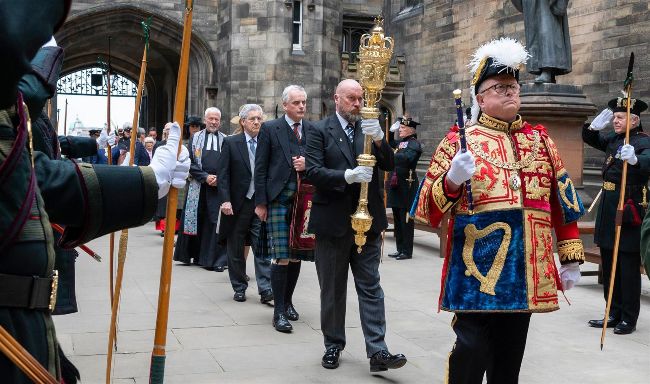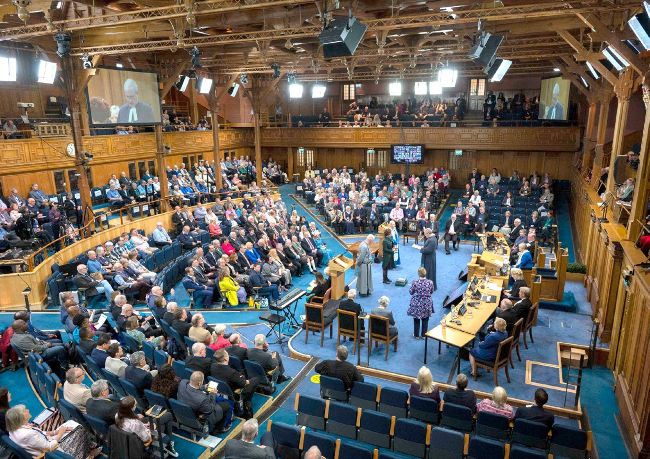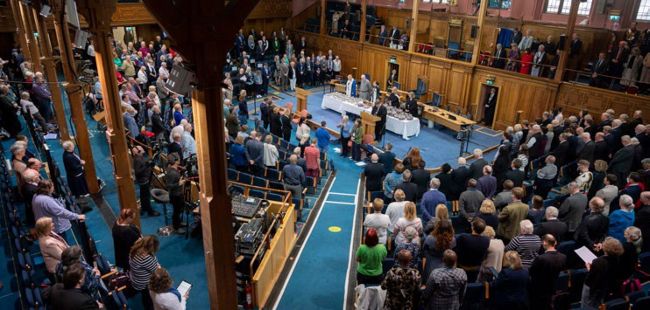Assembly 2023
Thomas Baldwin reports on the business of this year’s General Assembly of the Church of Scotland which took place in May.

Thomas Baldwin
‘A NEW REFORMATION’
The convener of the Church of Scotland’s Assembly Trustees has urged the Church to display a new spirit of Reformation in the face of falling membership and ministry shortages.
The Rev David Cameron told the General Assembly that it was a ‘critical time’ for the church but urged Commissioners to imagine an exciting future.
“Imagine Church where members are enthusiastic about doing things differently,” he said.
“Imagine listening to one another and dreaming bold dreams and having the energy and encouragement to experiment and learn in the process. Imagine being able to move forward in positive ways tackling serious issues of the day, responding to the real need in Scotland. Imagine finding a creative way of getting different people with different views together to create a different future. Imagine planting new church communities where they’ve always been needed, breaking out of our constrained systems to do so.
“Sharing ministry for the pastoral care of the elderly in the aging congregations whilst recognising the need to be intergenerational, fully integrating our young people, shaping the life of the Church.
“The new alongside the old, energising and inspiring with the gospel imperative, ‘go and make disciples’.”
In his speech as outgoing Moderator, the Very Rev Dr Iain Greenshields also acknowledged the pain of the mission planning process, but urged all congregations to ‘take a long, careful look at who we are’. He added: “Out of lament and grief comes new life and new identity. And this year’s Moderator, the Rt Rev Sally Foster-Fulton, closed the week saying that that the church was ‘the body of Christ’ with ‘hands that aren’t afraid to get dirty’, ‘feet that walk the extra mile’, and ‘here to hold up a sister who’s struggling or sit with a brother who’s afraid’.
And she added: “We are part of something so much bigger than any one of us and we are blessed to be. So, challenges – bring them on.”
MISSION PLANNING AND CHURCH CLOSURES
Mr Cameron acknowledged the hurt and pain that had been caused by the Presbytery Mission Planning process over the past year, which he admitted ‘has felt harsh and rigid and people have not been as kind and pastorally sensitive as they should have been’. But he said the time had come to ‘lay down burdens which have been exhausting us all.’
The Trustees agreed to a proposal from the Rev Dr Doug Gay instructing them to explore alternative approaches to ministry planning which would ensure churches that can afford a minister (or be supported to afford one in the case of deprived areas) would be permitted to call one.
However, the Assembly rejected an Overture from the Presbytery of Glasgow which would have appointed a Special Commission to review the Mission Planning process. Mr Cameron said that setting up a Commission at this stage would be premature and bring delay, but assured the Assembly that review was built into the process. He urged them to ‘embrace instead the task of rolling up our sleeves and getting involved in this good work going forward’.
During the debate of the General Trustees, the Assembly was assured that there is no quota for the number of church buildings that should be closed.
As some Commissioners expressed concern about the number of churches that are earmarked for closure under Presbytery Mission Plans, the Rev Scott Rennie, vicechair elect of the Trustees, said: “There is no quota. There has never been a quota, in any presbytery.” Adding that buildings could either be an asset or a drain on mission, he added: “The point of the exercise, in partnership with presbyteries, has been to try and find that middle balance, alongside affordability.”

Photos credit: Andrew O’Brien for the Church of Scotland
The Trustees accepted a new section from the Rev Dr Grant Barclay confirming that ‘the Church of Scotland seeks to have adequate spaces in as many places as are properly affordable’.
The Assembly approved a section welcoming progress on the Presbytery Mission Planning Act, despite Dr Gay saying he didn’t think that reflected the feelings across the Church about the Mission Planning process: “I think we have gone about this in a way which has been disempowering to congregations and harmful to our mission.”
MINISTRY STRESS
A study is to be carried out into causes of stress among Church of Scotland ministers, after the General Assembly was told there was a crisis in morale in the church.
The Faith Nurture Forum convener, the Rev Rosie Frew, agreed to the work proposed by the Rev Sandy Horsburgh. Mr Horsburgh said: “We are in crisis. Morale is low.
“Asking for a survey is not asking for much. But a church should be an institution which has care at its heart, and doing a survey and committing to learning from and acting on its results will be a real sign of a church caring for its ministers.”
The Rev Roddy Hamilton said that presbytery planning had had a major wellbeing consequence on him and colleagues in the ministry.
He said: “I know at least half a dozen of my colleagues who have demitted in the last year, not to another job but just to get away from the church, because staying would make them more ill. And I don’t know how many more are just holding on.”
Mrs Frew said that currently four per cent of ministers are off sick, 14% of those with work-related stress.
“We are living in incredibly stressful times, not just because of mission planning,” she said. “Many of the causes of stress are relational breakdowns – people not being kind or considerate or respectful to one another. I’m not denying this is the hardest of situations, but we could all be careful with the language we use and how we treat other people as we all go through this together.”
WORKING WITH OTHER CHURCHES
The Church of Scotland is to ‘initiate a conversation’ across the church and with sister churches in Scotland about how they can work together in mission and service.
The instruction to the Ecumenical Relations Committee followed an opening day in which the church was urged to build on its interdenominational relationships by the Moderator, guests from other churches, the Lord High Commissioner and even King Charles III.
In his first letter to a General Assembly, King Charles said he had been ‘especially heartened’ to hear of the ecumenical pilgrimage of peace to South Sudan, undertaken by the Moderator of the General Assembly of the Church of Scotland, the Archbishop of Canterbury and the Pope in February. He added: “Messages of justice, peace and reconciliation made all the more powerful by their visible presence which signified both the unity and the diversity of the church.”
The King also said that he had been ‘greatly encouraged’ by the signing of the Saint Margaret Declaration of friendship between the Church of Scotland and the Catholic Church.
King Charles’ representative at the Assembly, the Lord High Commissioner, Lord Hodge, also urged the church to continue its ecumenical work, saying that by working together, in a time of people being willing to promulgate fake news, the Christian denominations could ensure ‘that the Christian voice is heard in the market of ideas in Scotland and more widely’.

All photos credit: Andrew O’Brien for the Church of Scotland
The Moderator, the Rt Rev Sally Foster-Fulton, echoed his call in her opening remarks, saying that by working together with other churches ‘we amplify our voice calling for love, justice and equity, we embody values Christ called us to’.
At the presentation of ecumenical and overseas visitors, the Assembly was addressed by the Rev Fiona Bennett, Moderator Designate of the General Assembly of the United Reformed Church. Minister of Augustine United Church in Edinburgh City Centre, she said that her own denomination was facing similar organisational challenges to the Kirk, and developing similar approaches to address them.
Recalling the Lund Principle, that states churches should work together at all times except where there are deep differences of conviction, she asked: “How much of the activity of our churches which we are running in parallel is really rooted in deep difference?”
The convener of the Ecumenical Relations Committee, the Rev Ross Blackman, admitted that some ecumenical aspects of presbytery and mission planning may have been overlooked ‘in our rush to meet the incredibly challenging obligations’, and the Rt Rev Dr John Armes, representing the Scottish Episcopal Church, said that there had not always been consultation with ecumenical partners over church closures in remote areas.
Mr Blackman said: “We cannot hope to reach the whole of Scotland alone. But why should we go it alone, when we’re not alone?”
JEWISH-CHRISTIAN GLOSSARY
The oratorical high point of the week came when the Chief Rabbi, Sir Ephraim Mirvis, thanked the Church of Scotland for the ‘openness, sincerity, honesty and humility’ shown in conversations with the Jewish community in Scotland.
He was speaking as the Assembly welcomed a new Jewish-Christian Glossary, produced jointly by the two faith groups as an aid to interfaith discussions. The Glossary grew out of work to repair relationships between the Church and the Jewish community, which were damaged by the Inheritance of Abraham? report into the Holy Land in 2013.
Chief Rabbi Mirvis said: “The relationship between the Church of Scotland and the Jewish community suffered a setback. There was a difficulty, a crisis, a challenge. But what did we do about it? We were determined to engage in a process of healing and we achieved that.
“We have been on a journey, and it’s been a wonderful journey. We thank almighty God for bringing us to this precious moment… and we offer a prayer of supplication: may almighty God continue to bless us with success in all of our joint endeavours.”
The Chief Rabbi was given a standing ovation following the speech, and the Moderator told him: “I have rarely if ever heard such powerful, inspiring words in this General Assembly.”
Introducing the Glossary, the Very Rev Dr Susan Brown said that the idea behind it was not to provide definitive answers on difficult questions, but to deepen understanding between the two faith groups. “The words with which we have begun our explorations are but a tiny drop in the ocean of all the words and ideas it would be good for us to explore together,” she said. “But it is a start. A significant start.”
ASSISTED DYING
The Faith Impact Forum was instructed to work with the Theological Forum and other groups to explore the range of theological views and opinions around the issue of assisted dying.
The Forum had brought a section of its deliverance restating the Church’s longheld opposition to assisted dying, but this was defeated by a countermotion from the Rev Jonathan Fleming recognising ‘that there exists a range of theological views and ethical opinions’ on the subject.
The Rev Tara Granados brought an initial motion moving the Church ‘to a pastoral position of liberty of opinion’, although she withdrew this in favour of Mr Fleming’s proposal. Mrs Granados said she had watched her mother die of cancer as a teenager, and was now seeing her father’s slow decline from Parkinson’s dementia. She added: “I personally do not believe that our God wishes us to suffer, and that with appropriate safeguards society should allow people to choose to end their own suffering through assisted dying.
“There exists a range of biblical interpretation and ethical opinion. I am not seeking to reverse the church’s position, neither am I seeking to move to a position of neutrality. I am simply seeking to acknowledge the diversity of views.”
SLAVE TRADE APOLOGY
The Church of Scotland is to apologise for its role in the historic slave trade.
During the report of the Faith Impact Forum, the General Assembly commended a report which lists a number of Church ministers, elders and members who benefited from the slave trade or received compensation following the abolition of the slave trade.
The report also lists nine churches (some now closed) which were at least part financed by slave owners or are known to be the place of worship for merchants who benefited from the trade; and several more churches which contain memorials to people connected to slavery.
The Assembly accepted a Faith Impact Forum proposal that the Forum, ‘in partnership with the Theological Forum and the Equality, Diversity and Inclusion Group, prepare a statement of acknowledgment and apology for the Church’s involvement with and connection to historic chattel slavery, to be considered for adoption at a future General Assembly’.
The Rev Karen Hendry, convener of the Faith Impact Forum, said: “We are part of a world-wide Church, our prayers, and our actions, are thus informed by the shared, lived experience of people in many places…
“These wider partnerships, as well as bringing opportunities for mutual support and co-operation, also afford us the possibility of informed reflection, and the acknowledgement that there are aspects of our past, as a Church, that we look on now with deep regret.
“The Legacies of Slavery report gives substance to such a part of our history. And we seek to humbly acknowledge this and think about how we apologise.”
KEY MOMENTS
• During the report of the Theological Forum, the General Assembly approved the creation of a Book of Confessions forming the Church’s subordinate standard. The Book, to include the Westminster Confession of Faith, the Scots Confession, Nicene and Apostles Creeds, and the 1992 Statement of Faith, must now be approved by presbyteries under the Barrier Act.
• The Theological Forum agreed to review the Third Article Declaratory, which commits the church to providing the ‘ordinances of religion’ to every parish in Scotland. Bringing the motion, the Rev Robert Allan pointed out that Scotland was now mostly secular, and given the shrinking number of ministers asked whether it was possible for the Church to maintain the commitment of the Third Article. He said it was ‘a noble aim’ but that the church should be ‘humble enough to reconsider’.
• The Assembly passed an amendment from the Rev Bryan Kerr noting ‘with alarm’ research which suggests that black and ethnic minority ministers are being overlooked or asked not to officiate at funerals in favour of a ‘Scottish minister’. Mr Kerr said: “We ought to be standing up for our ministers and calling this out for what it is. It’s racist, it’s xenophobic and has no place in our church.” The Assembly Trustees are to work with the church’s EDI (equality, diversity and inclusion) group to highlight the issue and liaise with public bodies and funeral directors. The Rev Dr Kwame Ahaligah said: “Racist ideas should not be tolerated or explained away. The Gospel should challenge us to confront such opinions with a strong prophetic voice.”
• The Assembly approved the merger of nine presbyteries into a new Highlands
and Hebrides presbytery, Clèir Eilean Ì (literally translated as the Presbytery of Iona). The new group brings together the current presbyteries of Argyll, Caithness, Sutherland, Ross, Inverness, Abernethy, Lochaber, Lochcarron-Skye and Uist. The Presbytery of Lewis has not agreed to join the new presbytery, but Mr McRoberts said that it was hoped that would happen at a later date. The Principal Clerk, the Rev Fiona Smith, said that discussions with Lewis were ongoing and that relationships were good.
• The Assembly agreed the formation of an advisory Ethical Oversight Committee to help the Church of Scotland Investor’s Trust (COSIT) navigate ethical and theological issues around the church’s investments. The committee was proposed by a special commission set up following the debate in recent years on whether the church should disinvest from fossil fuels companies.
• Laura Dunlop KC was thanked for her years of service as Procurator of the General Assembly as she stepped down after 18 years. Mrs Dunlop, who was given a lengthy ovation by the Assembly, said it had been ‘an enormous privilege’ to have served. Jonathan Brodie KC was appointed as her successor.
• On the opening day, the Assembly was addressed by Joe Morrow, Lord Lyon King of Arms (the chief heraldic officer of Scotland) who defended the ceremonial elements of the General Assembly. He said that the pageantry represented the links between the church and state, celebrating the Church’s influence with the sovereign and governments.

Photos credit: Andrew O’Brien for the Church of Scotland
• There was a prolonged round of applause for the Rev Jean Montgomerie, the longest serving female minister in the Church of Scotland, who celebrated 50 years in the ministry recently. The Moderator told her: “We stand on the shoulders of giants, and we walk the path of pilgrims, and you are both.”
• The General Assembly endorsed calls from the Social Care Council (CrossReach) for improved pay in the care sector. Convener, the Rev Thom Riddell, told the Assembly that staff in the voluntary sector are now paid 19% behind ‘their counterparts in other agencies’. “That is not right. That needs to change,” he said, Mr Riddell drew the Assembly’s attention to the Scottish Faith Leaders Declaration, signed by the former Moderator and the Catholic Archbishop of Glasgow and urged commissioners to sign it.
• The General Assembly offered its customary warm welcome to the military chaplains, as it heard the Report of the Committee of Chaplains to HM Forces. Convener, the Rev Scott Brown, said: ”The bond between the Chaplain and your flock, including the Command at every level, is enduring, it is built upon decades of being seen as trustworthy, of being approachable, of being confidential, of being where your people are.” The Assembly was also addressed by Admiral Sir Ben Key, First Sea Lord. He said that the moral component of a fighting force was the most important and that the chaplaincy ‘is fundamental to our ability to have it, to own it and be confident in it’. ¤